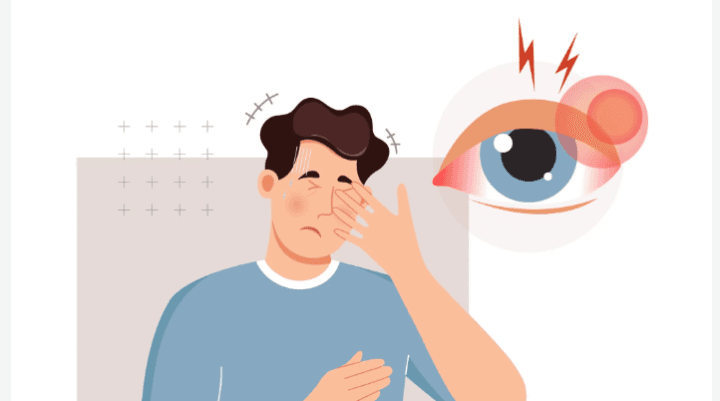Headache Behind Eye: Causes, Symptoms, and Relief
Table of Contents

Headache Behind Eye: Causes, Symptoms, and Relief
Meta Description: Learn about the causes of headaches behind the eye, common symptoms, and effective relief strategies. Find out when to seek professional help.
Meta Tags: headache behind eye, eye pain, migraine, cluster headache, sinus headache, tension headache
URL: headache-behind-eye-causes-symptoms-relief
Have you ever felt a sharp pain behind your eye that makes it hard to focus? A headache behind the eye can be uncomfortable and disruptive. If you’ve experienced this kind of pain, you might be wondering what causes it and how to find relief. Let’s explore the reasons for this type of headache, recognize its symptoms, and discuss ways to manage it.
Understanding Headaches Behind the Eye
Before we dive into the details, let’s clarify what happens when you experience pain behind your eye.
The Trigeminal Nerve
This nerve is responsible for sensation in your face, including your jaw and teeth. It plays a key role in transmitting pain signals from your eyes and surrounding areas.
Eye Muscles
The muscles around your eyes work hard to keep them moving smoothly. When these muscles become strained or tired, they can cause discomfort.
Common Causes of Headaches Behind the Eye
Headaches behind the eye can occur for several reasons. Here are some common causes:
Migraines
Migraines often cause intense pain behind one eye. They can come with other symptoms like nausea and sensitivity to light.
Cluster Headaches
These headaches can cause severe pain behind one eye and often occur in cycles. They may last for a few weeks or months before going away.
Tension Headaches
When you’re stressed or tense, you might develop a tension headache. This type of headache can create a feeling of pressure around your head and may include pain behind the eyes.
Sinus Headaches
Sinus issues can lead to pressure in your face and behind your eyes. This type of headache often worsens when bending over or during changes in weather.
Symptoms: Identifying Headaches Behind the Eye
How do you know if what you’re feeling is a headache behind the eye? Look for these signs:
- Sharp or throbbing pain
- Pressure or fullness in the eye area
- Pain that worsens with movement
- Sensitivity to light
- Nausea or vomiting (especially with migraines)
Diagnosing the Pain: What to Expect
If you’re experiencing persistent headaches behind your eye, it’s important to see a doctor for a proper diagnosis. Here’s how they typically approach it:
Medical History
Your doctor will ask about your symptoms, when they started, and what makes them better or worse.
Physical Exam
A physical examination may include checking your vision and assessing any tenderness around your eyes.
Imaging Studies
In some cases, imaging tests like X-rays or MRIs may be ordered to rule out any serious conditions.
Treatment Options: Finding Relief
Once you’ve identified the cause of your headaches, there are several ways to manage them:
Medications
- Over-the-counter pain relievers like ibuprofen or acetaminophen
- Prescription medications for specific types of headaches
- Eye drops if dry eyes are contributing to the problem
Lifestyle Changes
Making simple adjustments can help reduce the frequency of headaches:
- Improve sleep habits
- Reduce stress through relaxation techniques
- Stay hydrated and maintain a balanced diet
Alternative Therapies
Some people find relief through alternative treatments such as acupuncture or massage therapy.
Home Remedies: Quick Fixes You Can Try
While professional help is often necessary, there are home remedies that may provide temporary relief:
- Apply a cold or warm compress to the affected area.
- Use over-the-counter pain relievers.
- Practice relaxation techniques like deep breathing or meditation.
Prevention: Tips to Avoid Future Headaches
To reduce your risk of developing headaches behind the eye, consider these preventive measures:
- Maintain good posture while sitting or using screens.
- Take regular breaks from screens to rest your eyes.
- Manage stress effectively through exercise or mindfulness practices.
When to Seek Medical Attention
If you experience persistent or severe headaches behind your eye, it’s important to consult a healthcare professional. Look out for these warning signs:
- Severe or worsening symptoms
- Difficulty with daily activities
- Any neurological symptoms like numbness or weakness
The Emotional Impact of Chronic Pain
Chronic headaches can affect not just physical health but also emotional well-being. They may lead to anxiety about future episodes and feelings of frustration.
The Future of Headache Treatment
Research continues to advance our understanding of headaches and their treatment options. New therapies may include:
- Devices that help manage pain
- Improved medications with fewer side effects
- Better diagnostic techniques for accurate assessment
Conclusion
Headaches behind the eye can be uncomfortable and disruptive. By understanding their causes and recognizing symptoms early on, you can take steps toward effective management. With proper diagnosis and treatment strategies, many individuals find relief from their symptoms. If you’re experiencing persistent or severe headaches, don’t hesitate to reach out to a healthcare professional for guidance. Taking action now can lead to a more comfortable future.
FAQs
Can dehydration cause headaches behind the eyes?
Yes, dehydration can trigger headaches including those felt behind the eyes. Staying well-hydrated is important for preventing these types of headaches.
Can eye strain cause headaches behind the eyes?
Yes, prolonged eye strain from activities like staring at screens can lead to headaches behind the eyes.
Are headaches behind the eyes a sign of a serious condition?
While most headaches behind the eyes are not serious, persistent or severe pain could indicate an underlying condition that requires evaluation by a doctor.
Can allergies cause headaches behind the eyes?
Yes, allergies can lead to sinus congestion which may result in pressure and pain behind the eyes.
How long do headaches behind the eyes typically last?
The duration varies depending on the cause; some may last for a few hours while others could persist until treated.














Post Comment